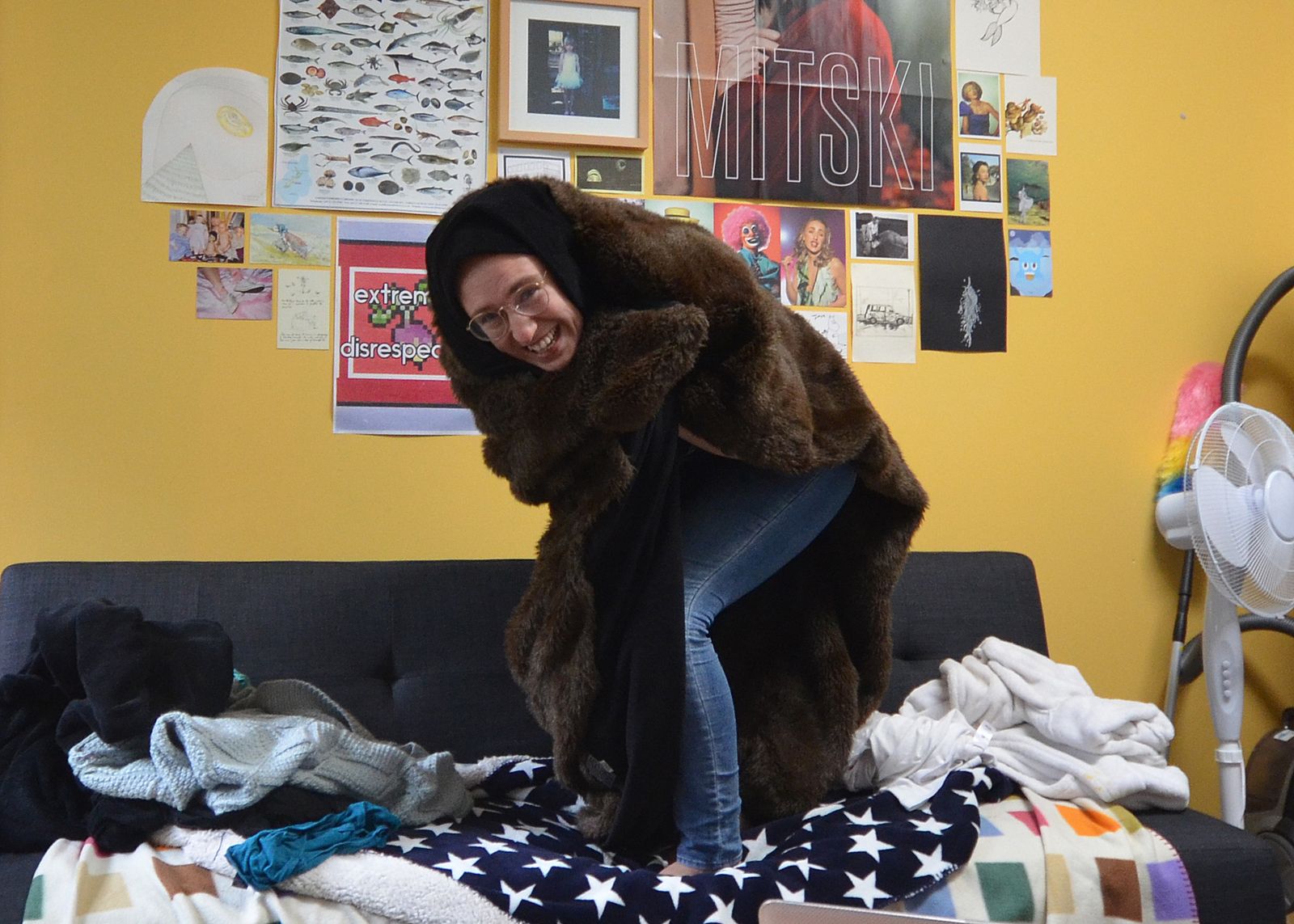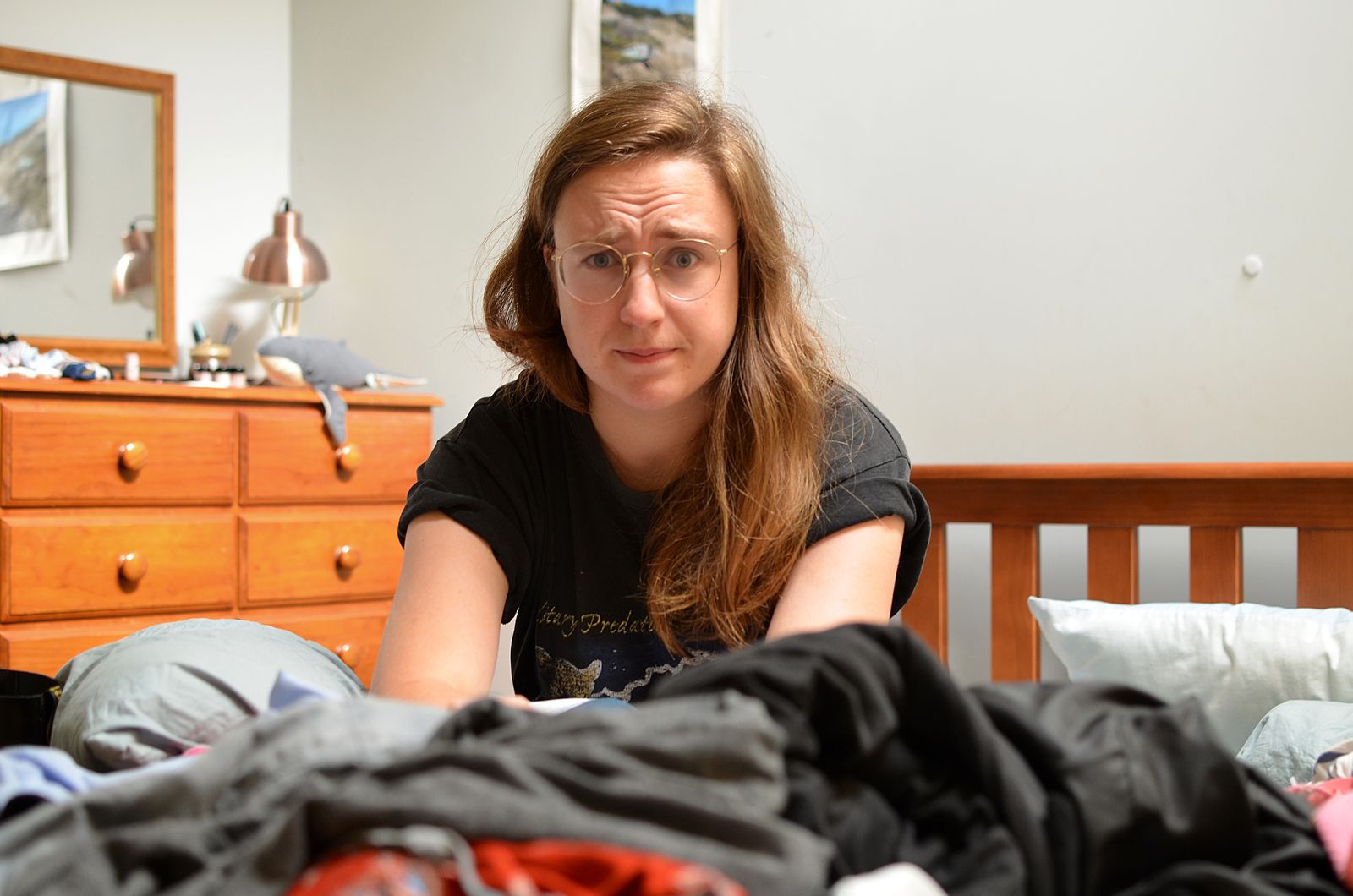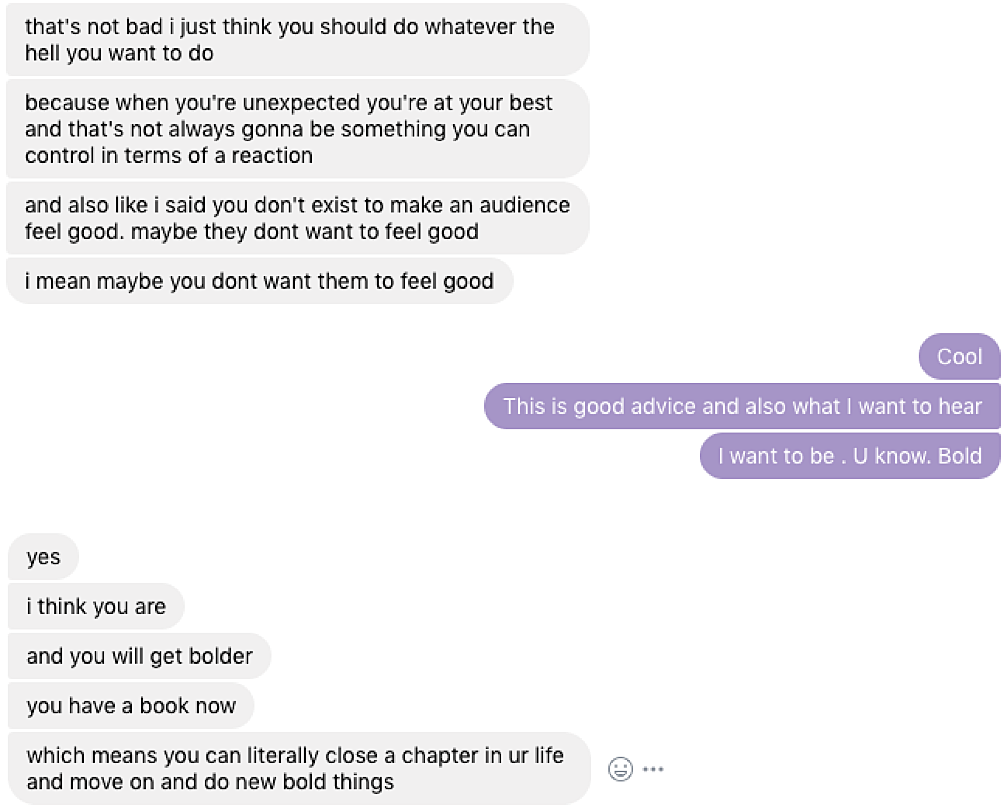The Art of the Self-roast
Was Hannah Gadsby’s Nanette right about everything? Freya Daly Sadgrove discusses the purpose and the pitfalls of self-deprecation for laughs.
When I was a stupid child, I took myself extremely seriously. I took everything seriously; the bar was astonishingly low for shit that hurt my feelings or wound me up. But when I was about 13 I made a significant discovery. I realised that I could just decide that I, and my entire existence, was a great joke, and in doing so I could protect myself from all manner of misery. I know everyone thinks their life is a joke at times, but have you ever actually stood on a rake and had it shoot up and hit you in the face? And then, later that very day stood on a different rake and had the same thing happen? I have.
It may be bad self-care to think of myself as a joke, but it’s also science. I learned that I could use it to my advantage. If someone laughs at me, I laugh too, and then they’re laughing with me, not at me, the suckers. If I’m worried someone’s going to think something bad about me (I always, always am), I just think it first, and then I make a joke out of it, and it sucks all the power out of their potential bad thought. Someone calls me names? I adopt them as my nicknames. I admit that this hasn’t protected me from misery as much as I would’ve liked, but it’s definitely done something.
Several years have passed since first I began my merciless self-roast. I’ve got better at it – there’s definitely a line you have to toe before you really start putting people off, although that line is pretty far away in New Zealand, where we live to deprecate ourselves. And I’ve got better at writing poems. It’s important to note that I am also mentally ill, because it has a bearing on a lot of what I make. So being a writer, being someone who wants to make people laugh, and also happening to be semi-fuckin’ mental, are the cornerstones of my shit.
One other thing that is essential to my creative practice is that I’m a performer. It’s easy to say the reason is that I’m a massive attention seeker, because that’s true and because it’s a ready-made self-neg, but there is more to it than that. The honest truth – and it seems kind of paradoxical – is that being on stage makes me feel fuckin’ real. You just have to take my word for it. I become myself onstage, when I get it right. Plus it’s where I can get laughter – the greatest feedback loop of all.
But I am also a person who feels crushing shame about pretty much every decision I make. My own motivations for everything I do repulse me. I write a lot of poems about things that I think other people will judge me for – I judge myself for them, so why wouldn’t they? My purpose in doing this is twofold and contradictory. On the one hand, I want to beat people to the punch before they write me off as a terrible person. Like, you don’t have to hate me because I’ve got it covered! On the other, I want people to agree with me and write me off as a terrible person. I want to feel justified.
In my writing I can be honest about things that I shrink from in real life – the major one being my massive repressed rage. There’s a lot of rage in my jokey poems. I think that’s part of why they sometimes make people uncomfortable. It’s a kind of sneaky rage; there is a meanness in telling jokes people aren’t sure whether to laugh at. And to read them aloud for an audience, to watch people react in the moment, knowing they’re watching me watching them react, makes me feel free and naughty in a way that I spend the rest of my time desperately wishing to be.
Some old dude poet who I hadn’t heard of once accosted me after a reading because he wanted to shoot the shit about bipolar with me, but before he got into it he was like, “Yeah I see what you’re doing, you’re one of these vulgar girl-poets, you’re going for the shock factor.” I was like, “Ugh lol,” but I said it in my head, because of my inability to face conflict in real life. I watched him talk to me about his experiences for a bit while I thought about “the shock factor.” It’s true, but it’s true in a way cooler way than how he said it. His attitude is a puny version of exactly the thing I am often reacting to when I choose to say ‘shocking’ things.
Condescending men make me angry, but I rarely feel capable of expressing that to them in the moment. Condescension works on me; it’s so easy to make me feel small and powerless. The idea of me fighting back has always been, in its own sad little way, actually laughable. I have always dealt with my anger by redirecting it at myself, because I feel guilty about getting angry. “Why should someone as pathetic as me get angry? People are right to condescend to me; my anger is unjustified, wrong, stupid, naive.” Those are the things I have told myself since I was really young, and they are really hard to grow out of.
I censor myself in a lot of ways in my normal life. I spend time and energy trying really hard to put people at their ease – even people I don’t like, even people who don’t deserve to be put at their ease. Even cruel people. It’s a useful skill to have developed in some ways – it helped me get by as a young person, when I didn’t have the language or the agency to express my anger safely – but it also left me spineless. And now I am angry that I felt like I had to do that.
There is a long and rich history of ladies making vulgar art, and I don’t mind at all being a part of it
People who know me might call bullshit when I say I censor myself – but that’s because I have been teaching myself not to; teaching myself to relax enough to let me be me, like the real Slim Shady. Being a bit too honest is me overcompensating for many years of covering up my shame. And the easiest thing to be unsettlingly open about is bodily functions, so that’s what comes out first.
This is all a way of grappling with my very internalised misogyny. When I was a teenager a man told me that he didn’t like it when girls swear because it’s “unladylike,” which was insignificant enough for me to actually show some backbone about, by immediately and forevermore getting a thousand times more of a potty mouth. Would have been better if I could have enumerated the reasons why he could fuck right off at the time – but, baby steps. In any case, it’s unsurprising to me that there is a long and rich history of ladies making vulgar art, and I don’t mind at all being a part of it. It is a way for me to show some version of strength. And I am getting stronger.
But, fundamentally, this is the shit that doesn’t matter to the reader. My extremely sharp friend Ursula reminded me of this recently:
It’s true that my experience is not unusual – like, I live in Wellington; I don’t have to walk very far to find another depressed person. In writing poems that make jokes about how I hate myself, my hope – like anyone who makes anything – is that people will read them and find something in them that they identify with. Not so that they feel encouraged to hate themselves, but so that they can look at the idea of hating the self and laugh at it. Because what the hell else can you do?
Look, I’ve watched Hannah Gadsby’s Nanette and I know it’s supposed to be like, disempowering or something to make jokes about yourself now. Yes I am simplifying hard, and yes, perhaps I’m not giving her enough credit for the conscious contradiction she is embodying by performing a comedy show critiquing comedy, and yes I am worried you’re going to think something bad about me when I say that I have some problems with Nanette. But the idea that to mine your trauma for self-deprecating jokes is to do a disservice to your story makes me, naturally, deeply uncomfortable.
I know Gadsby is talking about her personal experience but, like my friend Ursula says, you can’t talk about your own experience on an artistic platform without expecting people to take something from it to look at their own lives with. That lesson is what I took from Nanette (and it did feel like a lesson). I don’t think it was Gadsby’s intention to tell off other women trying to process trauma and express themselves, but I felt told off. And I hate being told off ’cause I’m still a fucking teacher’s pet at age 26. When she said, “laughter is just the honey that sweetens the bitter medicine,” I felt unexpectedly outraged. I get her point, because it does sweeten the bitter medicine, but for me laughter is not ‘just’ anything. Laughter is the thing. Why would you not sweeten the bitter medicine? The medicine is so bitter. Unbearably bitter. I am essentially still alive because of laughing, especially at myself. (Also because of smoking weed.)
But I do find myself at a point in my life where I need to think really hard about the issues of writing and performing (comedy) poetry that uses my own self as material. I do have to ask myself constantly if I am causing harm by trying to make people laugh at my shame. Not only harm to others, but harm to myself in the way that Gadsby describes. Am I perpetuating, for myself and others, body-hate, toxic attitudes in relationships, stigma around mental illness?
That last one is a real chestnut. Everyone’s always talking about ‘starting the conversation’ but no one seems quite prepared to follow that conversation where it leads. There’s a bit of an internet culture around self-care, and reaching out, and reaching in, that I (and I’m definitely not alone in this) find uncomfortably cutesy and simplistic. An adult colouring book is not gonna calm my suicide urges, bro…no offence but it’s like, probably gonna exacerbate them.
So in some ways my nasty jokes are a reaction to that culture. Mental illness isn’t fuckin’ pretty or palatable. Nor is it a free pass to treat people like shit. I feel terrible guilt and shame for the things I have put people through – people that I love. Should I pretend that I don’t feel that guilt? Should I light some candles and take a bath and forgive myself? Furthermore, should I attempt to make people believe that my relationship with my body is hunky dory, or that my romantic relationships aren’t grossly affected by my treacherous brain?
The fact of having written about it makes me feel as if I have some degree of agency in how I deal with my own hurt
The answer is that, no, I obviously shouldn’t pretend those things – but that doesn’t mean I have to write about them. Why write personal poetry – what’s the point? Writing it doesn’t always make me feel better; in fact it often makes me feel worse. But – and I think this is the case for a lot of writers – the fact of having written about it makes me feel as if I have some degree of agency in how I deal with my own hurt.
I get a real kick out of making it all as ridiculously ugly as I can – as ridiculously ugly as it is. And ridiculousness, and ugliness, can be fertile grounds for cracking the hell up. There’s nothing cute about these fucked-up feelings I have that sometimes make me cower in the face of my own life, or that blow up into reasons to harm myself physically. It’s a no-brainer that taking those feelings and turning them into reasons to laugh is a better way to deal with them. Laughing at them forces me to look at them in a different way, and doing that gets me a little bit closer to seeing them as subjective thoughts, rather than objective facts. Once I do that, I can sometimes muster the energy to shower! I’m on the up and up.
At LitCrawl last year, my buddy Eamonn Marra put on an event called Stretched Legs and he let me be in it. This was great for my ego because the premise of the event was essentially “writers who are funny read their funny work.” Everyone else was great and hilarious: Eamonn, Finnius Teppett, Brannavan Gnanalingam, Madeleine Chapman. All absolute champs and compelling as hell. Then it was my turn, and I went up and said what I considered to be one of the funniest things I’d ever thought of saying, which went like this:
“In preparation for this event, I made a list in the notes app on my phone of the three things I find funny. They are:
- poo
- mental illness
- making fun of my ex-boyfriend Finnius Teppett.”
Unfortunately, it turned out my tone wasn’t upbeat enough to sell it as a joke. It did get some laughs, but not the amount that I needed in order not to turn into a hideous monster who screams “Suck my ass” at an innocent audience member and alienates most of the crowd. Afterwards, a friend said that I’d given the impression that I hated myself and hated the event and hated everyone for being there watching me. Which was not exactly the case. I was in a massive depressive episode at the time, so it’s true that my self-hate was peaking, but I loved the event and I loved that there were people there watching me. I feed on laughter. This time, when I didn’t get enough, I got aggressive. Honestly, it was kind of fun – but also obviously I will be very ashamed about it forever and ever.
Sometimes I don’t want to release tension – I want to increase it
People have on occasion suggested that I try stand-up, but I find myself wholly incapable of it. The stand-up format is to set up and then subvert expectations for the punchline. Hannah Gadsby says the definition of a joke is a release of tension, and that’s what makes the audience laugh. That makes sense, I suppose. But sometimes I don’t want to do a set-up; I just want to go straight to the subversion. And sometimes I don’t want to release tension – I want to increase it. Or maybe I just want to make jokes that can do both.
Here is one I am working on:
a nurse once tried to convert me
to christianity in a hospital bathroom
just after I’d done a shit....................job of trying to kill myself
This is extremely funny to me, despite being about one of the worst things I’ve ever done. It also makes me go cold inside! But not as much as I did when I tried to die. I like having these contradictory feelings. I especially like being able to capture them in a poem.
I think the laughter feedback loop, while it makes me feel fucking alive and valuable, can be a bit of a trap. I do fall into habits, I do have tricks. It’s part of navigating the intersection between being a writer and being a performer: I know the jokes I can say to get the audience to warm to me. If you’re talking about heavy shit, you do need to cut your crowd a bit of slack sometimes. And I do, mostly, choose to read the poems that let people know they’re allowed to laugh, rather than the ones that kind of dare them to laugh and condemn them whether they do or don’t. But I’m less willing than I have been in the past to keep those other jokes quiet. I’ve written them, and if I’m willing to share them on the page, why not out loud too?
Ursula is on my team:
It’s not always possible to laugh, obviously. I can be pretty mean-spirited in my mockery. I’m a bit of a bully to my feelings; I exasperate my psychologist. But my feelings bully me too, real bad, and revenge is fuckin’ sweet. And if laughing at yourself is a survival tactic or a coping mechanism, then I’m gonna try real hard not to apologise for coping or surviving.
All photos of Freya by Hannah Newport-Watson





